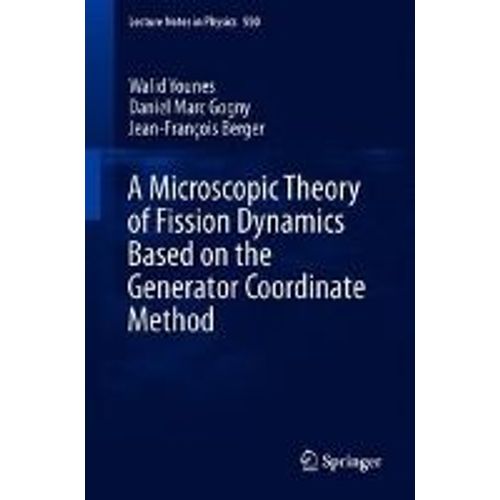

A Microscopic Theory of Fission Dynamics Based on the Generator Coordinate Method - Younes, Walid
- Format: Broché
- 344 pages Voir le descriptif
Vous en avez un à vendre ?
Vendez-le-vôtre30,77 €
Produit Neuf
Ou 7,69 € /mois
- Livraison à 0,01 €
- Livré entre le 2 et le 5 août
- Payez directement sur Rakuten (CB, PayPal, 4xCB...)
- Récupérez le produit directement chez le vendeur
- Rakuten vous rembourse en cas de problème
Gratuit et sans engagement
Félicitations !
Nous sommes heureux de vous compter parmi nos membres du Club Rakuten !
TROUVER UN MAGASIN
Retour

Avis sur A Microscopic Theory Of Fission Dynamics Based On The Generator Coordinate Method Format Broché - Livre Physique - Chimie
0 avis sur A Microscopic Theory Of Fission Dynamics Based On The Generator Coordinate Method Format Broché - Livre Physique - Chimie
Donnez votre avis et cumulez 5
Les avis publiés font l'objet d'un contrôle automatisé de Rakuten.
-

Jazz Chants Old And New
Occasion dès 40,97 €
-

Computational Homology
Neuf dès 37,79 €
-

The Laws Guide To Drawing Birds
1 avis
Neuf dès 29,02 €
-

Statistical Thermodynamics
Neuf dès 20,82 €
-

An American In Provence
Neuf dès 40,78 €
-

Paul Strand (Aperture Masters Of Photography Series)
Occasion dès 37,99 €
-

Some Of Us Just Fall
Neuf dès 17,71 €
-

Susann - My All Time Favourite Model
1 avis
Neuf dès 35,58 €
Occasion dès 72,70 €
-

Cahier De Recettes: Livre De Cuisine À Personnaliser Avec Tes 100 Délicieux Recettes. Carnet À Remplir En Format A4. Cahier De Recettes Avec Le Table De Matières. Parfait Comme Cadeaux
Neuf dès 34,99 €
-

Fundamentals Of Investing, Global Edition
Neuf dès 23,07 €
-

400 Floral Motifs For Designers, Needleworkers And Craftspeople
Neuf dès 34,76 €
Occasion dès 35,82 €
-

An Introduction To Surreal Numbers
Neuf dès 24,89 €
Occasion dès 58,85 €
-

Data Engineering With Python
Neuf dès 27,67 €
-

Introduction To English Sentence Structure
Occasion dès 19,63 €
-

Atlas Of Knee Arthroscopy
Neuf dès 20,82 €
-

Immunohistochemistry: Basics And Methods
Neuf dès 20,82 €
Occasion dès 342,99 €
-

The Importance Of Being Educable
Neuf dès 36,99 €
Occasion dès 44,99 €
-

The Art Of Ponyo
Neuf dès 22,18 €
-

Nuovissimo Progetto Italiano 1 + Idee Online Code
1 avis
Neuf dès 23,52 €
Occasion dès 18,32 €
-

The Princeton Companion To Applied Mathematics
Neuf dès 130,18 €
Occasion dès 32,10 €
Produits similaires
Présentation A Microscopic Theory Of Fission Dynamics Based On The Generator Coordinate Method Format Broché
- Livre Physique - ChimieAuteur(s) : Younes, Walid - Berger, Jean-François - Gogny, Daniel MarcEditeur : Springer International PublishingLangue : AnglaisParution : 01/01/2019Format : Moyen, de 350g à 1kgNombre de...

Résumé :
This book introduces a quantum-mechanical description of the nuclear fission process from an initial compound state to scission. Issues like the relevant degrees of freedom throughout the process, the way of coupling collective and intrinsic degrees during the fission process, and how a nucleus divides into two separate daughters in a quantum-mechanical description where its wave function can be non-local, are currently being investigated through a variety of theoretical, computational, and experimental techniques. The term ?microscopic? in this context refers to an approach that starts from protons, neutrons, and an effective (i.e., in-medium) interaction between them. The form of this interaction is inspired by more fundamental theories of nuclear matter, but still contains parameters that have to be adjusted to data. Thus, this microscopic approach is far from complete, but sufficient progress has been made to warrant taking stock of what has been accomplished so far. Theaim is to provide, in a pedagogical and comprehensive manner, one specific approach to the fission problem, originally developed at the CEA Bruy?res-le-Ch?tel Laboratory in France. Intended as a reference for advanced graduate students and researchers in fission theory as well as for practitioners in the field, it includes illustrative examples throughout the text to make it easier for the reader to understand, implement, and verify the formalism presented.
Biographie: Walid Younes received his Ph.D. in nuclear physics from Rutgers University in 1996, and is currently a member of the nuclear theory and modeling group at the Lawrence Livermore National Laboratory. In 2006 he launched a program with Daniel Gogny to develop a microscopic theory of fission. ...
Sommaire: Preface.- Part I: Tools for a Microscopic Theory of the Nucleus.- Hartree-Fock-Bogoliubov Theory.- Matrix Elements of the Finite-Range Interaction.- The Generator Coordinate Method.- Part II: Application to Low-Energy Fission.- General Concepts.- Numerical Application to 240Pu Fission.- Summary and Outlook for Future Directions in Fission Theory.- Appendix A.- Appendix B.- Appendix C.- Appendix D.- Appendix E.- Appendix F.- Appendix G.
Détails de conformité du produit
Personne responsable dans l'UE
